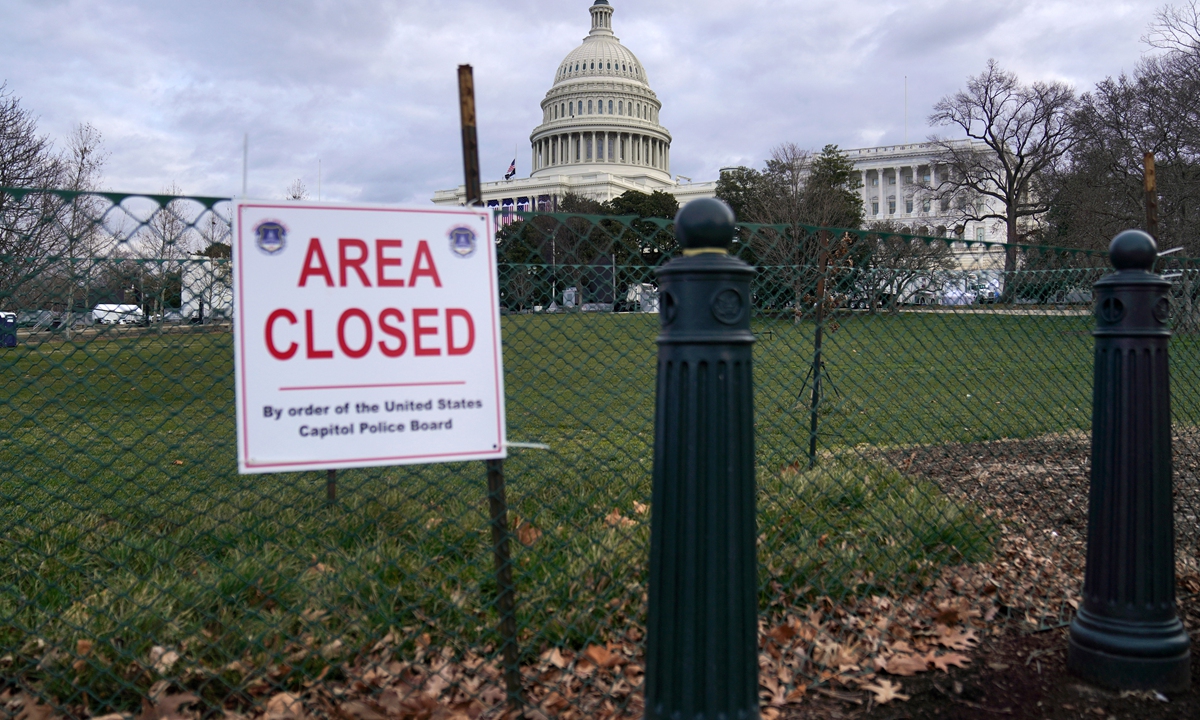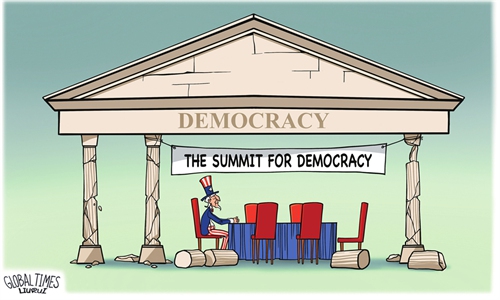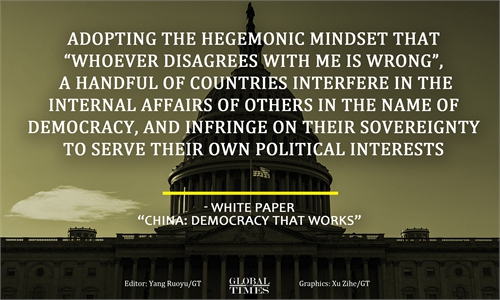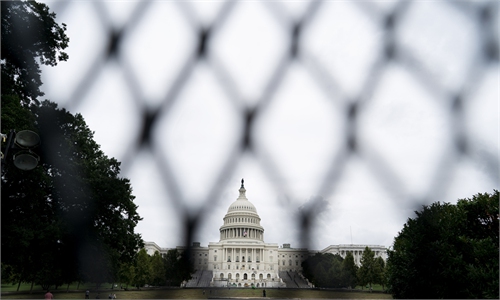
A sign reading "Area Closed" is posted on fencing outside the US Capitol in Washington, DC. Photo: AFP
Editor's Note:
The Summit for Democracy hosted by the US will be held from December 9 to 10, which is "to relaunch their model of democracy which is in present times in great crisis," said Fabio Marcelli (Marcelli), director of the Institute for International Legal Studies of the National Research Council, Italy. In his opinion, there is a strong basic defect in this so-called democratic summit, being "the lack of universality and the exclusion of many important experiences which can give an important contribution to the concretization of goals like promotion of democracy and human rights." The following is the full transcript between Marcelli and Global Times (GT) reporter Yan Yuzhu in a written interview on issues related to the summit as well as the essence of democracy and democratic diversity.
GT: What's the main problem with the US definition and division of democracy and non-democracy? If the US insists this division and considers only "democratic countries" legitimate, how will it affect the global security, as well as pragmatic cooperation between the US and countries such as China and Russia?
Marcelli: The main problem is the fact that the US has its own concept of democracy and pretends to impose it on the rest of the international community. At the contrary the experience shows us that there are different concepts of democracy, which need to be put in context and integrated among themselves, and that any attempt to export or impose a certain specific concept of democracy represents a clear symptom of an imperialistic mentality and is at any rate doomed to failure, like shown by several examples of world recent history, like Iran, Afghanistan and others.
GT: Illegal immigration is a major problem that has been difficult to solve since the founding of the US. Although the US prides itself on being a "beacon of democracy and liberty," US law enforcement officials have gone so far as to openly wave whips to remove illegal immigrants from the US-Mexico border. Democracy is meant to promote equality, but does this behavior mean that American governance is going backward?
Marcelli: The problem of so-called illegal immigration affects nowadays all economically advanced countries, among them the US, but also the member states of the European Union. We have to be aware that the deep causes of such a phenomenon reside in the unequal development of the planet and in several problems exacerbated by the dominant model, concerning environment, internal and external conflicts, criminality and others. Without doubt, the attitude shown by the US employing violent methods in order to impede immigration represents a very worrying step backward, jeopardizing human rights. This has been a peculiar characteristic of the Trump administration, but unfortunately some of those methods are still followed by US President Joe Biden.
GT: A New York Times article suggests that the US and its allies drove much of world's democratic decline in the past decade, with a greatly diminished judicial independence and election fairness. What do you think are the main reasons for this? From this point of view, what's the purpose of the US hosting this summit?
Marcelli: I think that the US purpose in hosting the summit is that of relaunching their model of democracy which is in present times in great crisis, for the reasons recalled by The New York Times, but also for the dynamics of neoliberal globalization, which exalts the power of private enterprises and of finance not subject to any democratic control or scrutiny. I don't think however that this summit will be able to be something more than a mere attempt of propaganda. Other steps should be followed to try to set up a multilateral dialogue on those crucial matters including all components of the international community and not selecting among them following the criteria of the allegiance to the US model of democracy.
GT: As democracy has again become the main theme of American narratives at home and abroad after Biden came into office, intellectuals in the US are increasingly reflecting on its own democratic practices. A recent Harvard Youth Poll showed that more than half of American young people don't believe in US democracy. In this context, will this summit serve its purpose?
Marcelli: The Harvard Youth Poll is very interesting and should stimulate the US government toward self-criticism and to a sincere verification of the limits of their model. But I really don't know if such self-criticism will be undertaken. We have to hope so.
GT: In your opinion, what's the essence of democracy? How should democratic diversity be perceived in countries with various realities and different democratic practices?
Marcelli: The essence of democracy is the participation of people in public choices. There are, following different historical experiences, different paths able to reach this goal. There should be on every side more humbleness and readiness to [have] dialogue, and readiness to admit the limits of the different approaches pursued, but also respect for the choices made by other countries.
GT: Many US and European scholars argue that the Summit for Democracy is far from practical. It cannot solve real problems and truly promote equality and protect human rights, even jeopardize the practice of democratic diversity. What do you think of this argument?
Marcelli: I fear that they are right. A strong basic defect of the approach adopted in that occasion is the lack of universality and the exclusion of many important experiences which can give an important contribution to the concretization of goals like promotion of democracy and human rights, which are of overarching and supreme importance for the international community as a whole.



